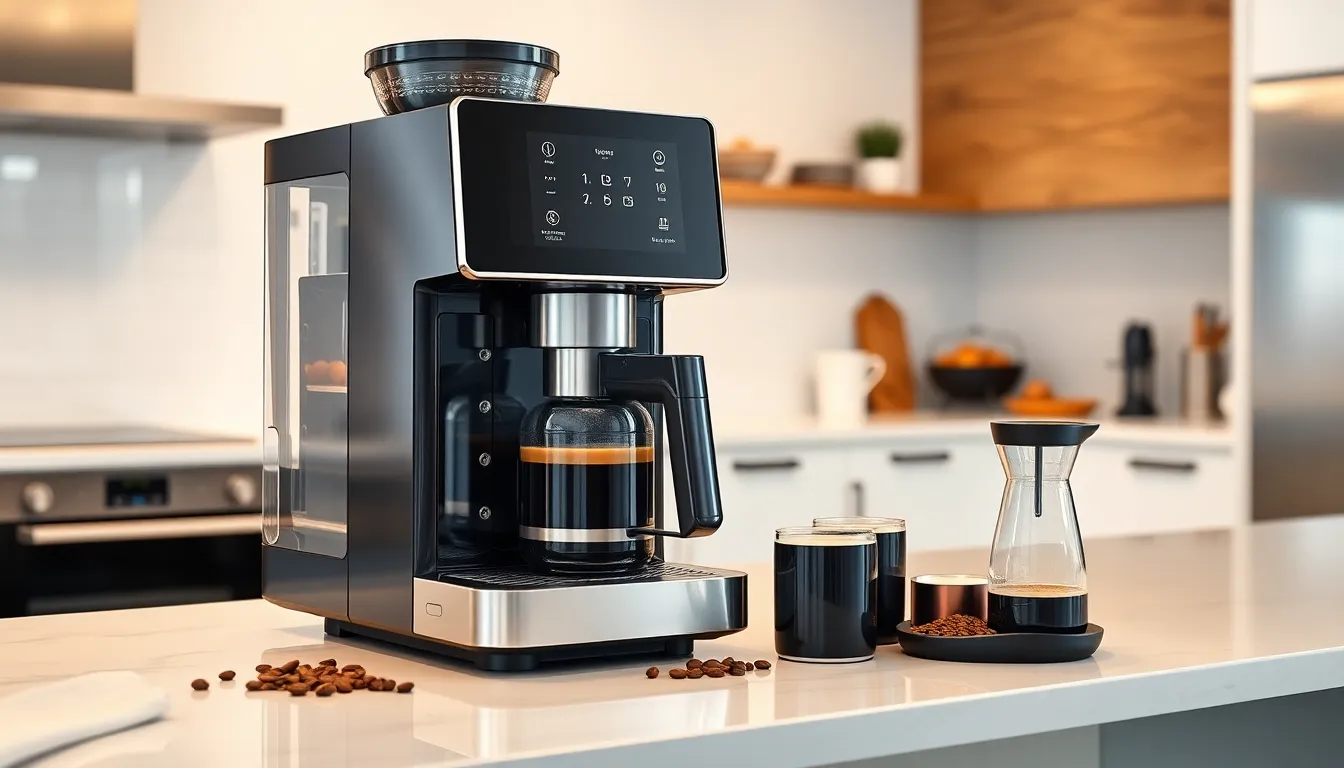In today’s fast-paced world, coffee and technology blend seamlessly to enhance the daily ritual of brewing the perfect cup. From smart coffee makers that can be controlled via smartphones to apps that track caffeine intake, technology is revolutionizing how coffee lovers experience their favorite beverage.
As people seek convenience and quality, innovations in coffee brewing methods and equipment are transforming traditional practices. Whether it’s a precision grinder or a connected espresso machine, these advancements cater to both casual drinkers and connoisseurs alike. The intersection of coffee and technology not only elevates the brewing process but also creates a community of enthusiasts eager to share their discoveries.
Table of Contents
ToggleThe Evolution of Coffee and Technology
Technology has significantly shaped the coffee experience, transforming both brewing and consumption. Innovations from the early stages of coffee preparation to today’s smart devices illustrate this compelling evolution.
Historical Context
Early coffee brewing methods date back to the 15th century in the Arabian Peninsula, where coffee beans were first roasted and brewed. By the 18th century, coffee houses emerged in Europe, becoming centers for social interaction and intellectual discourse. The invention of the espresso machine in the early 1900s marked a pivotal moment, enabling baristas to extract flavor efficiently. These historical milestones reveal how technology has continually influenced the global coffee culture.
Technological Advancements Over the Years
Numerous technological advancements have shaped coffee preparation:
- Drip Coffee Makers: Introduced in the 1970s, these machines allow for programmable settings, offering convenience for busy lifestyles.
- Espresso Machines: Modern espresso machines now feature digital controls, precision temperature regulation, and automatic milk frothers for barista-quality beverages.
- Single-Serve Systems: These systems launched in the early 2000s, providing quick and easy coffee solutions while maintaining flavor consistency.
- Smart Coffee Makers: Recent innovations enable remote operation via smartphone apps, allowing users to brew coffee on the go and customize settings.
- Caffeine Tracking Apps: These apps help consumers monitor their coffee consumption, promoting a balance between enjoyment and health awareness.
These breakthroughs demonstrate how technology continuously enhances the coffee experience, catering to both convenience-oriented consumers and quality-focused enthusiasts.
Modern Innovations in Coffee Brewing

Modern innovations in coffee brewing emphasize convenience, precision, and enhanced flavor. These advancements redefine the coffee experience, catering to diverse preferences and lifestyles.
Smart Coffee Machines
Smart coffee machines integrate connectivity features, allowing users to customize brewing settings remotely. Many models enable smartphone control, enabling scheduling, temperature adjustments, and brew strength modifications. Popular brands, such as Keurig and Breville, design these machines to sync with home automation systems, promoting a seamless experience. These devices often feature built-in grinders, ensuring fresh grounds for optimal flavor extraction. Additionally, some models include milk frothers for crafting café-style beverages at home.
Apps for Coffee Lovers
Caffeine tracking apps enhance the coffee experience by helping users monitor their intake. These apps, such as “Coffitivity” and “Bean Journal,” provide insights into caffeine consumption patterns and suggest ways to optimize brews. Many applications offer community features, where users share brewing techniques and favorite blends. Some apps also include guides for various brewing methods, ensuring that enthusiasts can explore and experiment with different flavors. These digital tools foster a deeper connection within the coffee community, encouraging exploration and sharing of experiences.
Sustainability in Coffee Technology
Sustainability in coffee technology focuses on reducing environmental impact and promoting ethical practices throughout the supply chain. Innovations in this area drive improvements in farming, processing, and consumption.
Eco-Friendly Innovations
Eco-friendly innovations in coffee technology aim to minimize waste and conserve resources. Examples include:
- Energy-efficient coffee machines: These machines use less power during brewing, which lowers energy consumption.
- Biodgradable coffee pods: Compostable pods reduce landfill waste and promote environmentally friendly disposal methods.
- Water-saving technologies: Systems that use less water for brewing and cleaning contribute to sustainable water management practices.
These innovations not only benefit consumers but also support broader environmental goals.
The Role of Technology in Sustainable Farming
Technology plays a crucial role in promoting sustainable farming practices in coffee production. Key technologies include:
- Precision agriculture: This technique utilizes data analytics and IoT sensors to optimize planting and irrigation, reducing resource use and enhancing yield.
- Blockchain: This technology improves traceability within the supply chain, allowing consumers to verify the source and ethical practices involved in coffee production.
- Mobile apps for farmers: These applications provide access to market information, weather forecasts, and best practices, enabling farmers to make informed decisions that lead to sustainable practices.
These advancements in farming technologies contribute to a more sustainable coffee industry, ensuring quality while protecting the environment.
The Coffee Supply Chain and Technology
The coffee supply chain increasingly relies on technology to enhance traceability, transparency, and distribution efficiency. Innovations in these areas are revolutionizing how coffee is sourced, processed, and delivered to consumers.
Traceability and Transparency
Traceability and transparency in the coffee supply chain have improved significantly due to technological advancements. Blockchain technology enables detailed tracking of coffee from farm to cup, ensuring ethical sourcing practices. It records every transaction and movement in the supply chain, providing consumers with information about the origin of their coffee, including the farm, processing methods, and trade practices.
Mobile applications assist farmers in recording and sharing critical data about their crops. These tools enable farmers to manage their yields, monitor quality, and comply with certifications. As a result, consumers gain access to transparent information, fostering trust through direct interaction with producers. Increased visibility promotes sustainable practices and allows consumers to make informed choices about their coffee purchases.
Impact of Technology on Distribution
Technology significantly impacts distribution within the coffee supply chain. Advanced logistics software streamlines the transportation process, optimizing routes and reducing delivery times. This efficiency ensures that coffee reaches consumers quickly while maintaining freshness and flavor.
Automated inventory management systems help roasters and retailers track stock levels accurately, reducing waste and improving supply chain responsiveness. Enhanced communication technologies facilitate real-time updates between farmers, distributors, and retailers. This coordination reduces delays and enhances overall supply chain performance.
E-commerce platforms provide consumers with direct access to specialty coffee from around the world. They enable consumers to explore various roasters and purchase beans online, expanding market reach for small producers. Technology continues to shape distribution, driving growth in the coffee sector and enhancing the overall consumer experience.
Future Trends in Coffee and Technology
Emerging technologies are set to reshape the coffee landscape, enhancing both brewing methods and consumer experiences. Innovations in automation, artificial intelligence, and data analytics promise to revolutionize how coffee is produced, brewed, and consumed.
Emerging Technologies
- Artificial Intelligence: AI-powered coffee machines optimize brewing parameters based on user preferences, adjusting variables like temperature and brew time for personalized flavors.
- Smart Sensors: Integrated sensors in coffee makers monitor freshness and flavor extraction, ensuring optimal taste with every cup.
- Mobile Applications: Apps provide users with real-time data on their brewing process and caffeine intake, allowing for tailored recommendations based on consumption habits.
- Cloud Connectivity: Coffee machines with cloud connectivity enable users to access recipes and brewing guides from anywhere, enhancing the overall coffee experience.
- Robotic Baristas: Several coffee shops are experimenting with robotic baristas that use precise algorithms to replicate professional brewing techniques, offering consistent quality and speed.
Predictions for the Coffee Industry
- Increased Personalization: As technology advances, consumers will see more personalized coffee experiences, including custom blends and unique brewing options based on taste preferences.
- Sustainable Practices: The coffee industry will adopt more sustainable technologies, focusing on eco-friendly packaging and energy-efficient brewing methods.
- Greater Transparency: Consumers will demand transparency in sourcing, leading to increased use of blockchain technology for traceability throughout the supply chain.
- Expansion of E-commerce: Online platforms will continue to grow, providing consumers with direct access to specialty coffees and subscription services tailored to individual tastes.
- Integration with Lifestyle Tech: Coffee technology will further integrate with smart home systems, allowing users to program their machines based on daily routines and preferences, enhancing convenience.
Conclusion
The intersection of coffee and technology represents a dynamic evolution in how individuals engage with their daily brew. As innovations continue to emerge, they not only enhance convenience and quality but also foster a vibrant community of coffee lovers.
The commitment to sustainability and ethical practices further enriches the coffee experience, ensuring that enjoyment doesn’t come at the expense of the environment.
Looking forward, the future holds exciting possibilities with advancements like AI and smart connectivity poised to redefine personal coffee experiences. As technology continues to shape the coffee landscape, it promises to deliver even more personalized and sustainable solutions for enthusiasts around the globe.





